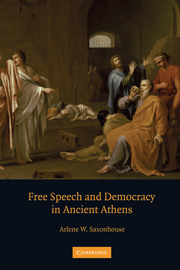4 - The Practice of Parrhêsia
Published online by Cambridge University Press: 06 January 2010
Summary
For George Grote, the nineteenth-century Philosophical Radical and close associate of John Stuart Mill, “[t]h eleven chapters of Thucydides” that comprise Pericles' Funeral Oration are “among the most memorable relics of antiquity” ([1851–6] 1900: 6.142); in particular, Grote's History of Greece highlights those passages that pay tribute to “an unrestrained play of fancy and diversity of private pursuit” (6.148). Sounding very much like the friend of Mill that he was, Grote explains: “[T]he stress which he [Pericles] lays upon the liberty of thought and action at Athens, not merely from excessive restraint of law, but also from practical intolerance between man and man, and tyranny of the majority over individual dissenters in taste and pursuit, deserves notice” because “all its germs of productive genius, so rare everywhere, found in such an atmosphere the maximum of encouragement” (6.149).
The liberties of the ancients have had their defenders and their attackers – as well as those who have questioned whether those liberties really existed. Indeed, Grote (most likely in response to Benjamin Constant's essay on “The Liberty of the Ancients Compared with that of the Moderns” from 1819) justifies the “peculiar attention” he devotes to the passage in the Funeral Oration on the “rich and varied fund of human impulse” in Athens “because it serves to correct an assertion, often too indiscriminately made, respecting antiquity as contrasted with modern societies – an assertion that the ancient societies sacrificed the individual to the state, and that only in modern times has individual agency been left free to the proper extent” (148).
- Type
- Chapter
- Information
- Free Speech and Democracy in Ancient Athens , pp. 85 - 99Publisher: Cambridge University PressPrint publication year: 2005
- 1
- Cited by



